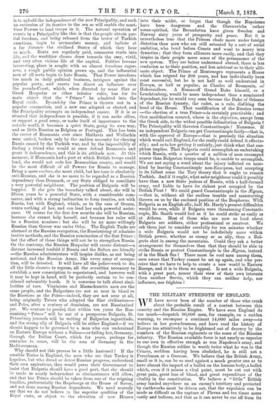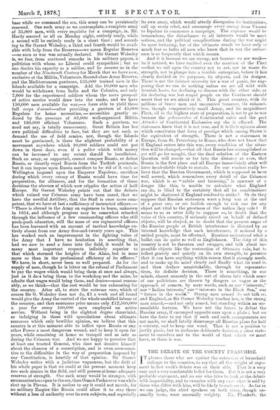THE MILITARY STRENGTH OF ENGLAND.
WE have never been of the number of those who croak about the probable result of a contest between this country and the Russian Empire. We have seen England do too much—despatch 80,000 men, for example, on a sudden warning, to reconquer a continent 14,000 miles away—to believe in her powerlessness, and have read the history of Europe too attentively to be frightened out of decency by the numbers of the Russian regiments or the mass of the Russian infantry. The Russian available force is not nearly so superior to our own in effective strengh as was Napoleon's army, and though the Russian soldier is worth twice what he was in the Crimea, serfdom having been abolished, he is still not a Frenchman or a German. We believe that the British Army, small as it is, can be so used against a much greater one as to have almost the impact of a bullet on the human body, a bullet which, even if it misses a vital point, must be cut out with great pain, great loss of blood, and great expenditure of the vitality in the constitution. We believe a " little " British army landed anywhere on an enemy's territory and protected by earthworks must be driven out, that the expulsion can be made as difficult as the capture of Plevna and ten times more costly and tedious, and that as it can never be cut off from its
base while we command the sea, this army can be persistently renewed. One such army as we contemplate, a complete army of 35,000 men, with every requisite for a campaign, is, Mr. Hardy assured us all on Monday night, entirely ready, while a second will be entirely ready in a short time ; and accord- ing to Sir Garnet Wolseley, a third and fourth would be avail- able with help from the Reserves—we mean Regular Reserves —as soon as war was actually declared. Sir Garnet Wolseley is, we fear, from scattered remarks in his military papers, a politician with whom no Liberal could sympathise ; but no one doubts his capacity as a soldier, and he assures us in the number of the Nineteenth Century for March that we have now, exclusive of the Militia, Volunteers, Second-class Army Reserve, and the Mediterranean garrisons, 133,000 trained men in the Islands available for a campaign. Add the 10,000 men who would be withdrawn from India and the Colonies, and only 7,000 for the experienced soldiers whom the mere prospect of active service would draw into the ranks, and we have 150,000 men available for war,—a force able to yield three full corps d arrne'e—after providing a garrison of 45,000 Regulars for home necessities, — necessities greatly re- duced by the presence of 83,000 well-organised Militia and 180,000 efficient Volunteers. Such a garrison, we need not say, is totally unnecessary. Great Britain has her own political difficulties to face, but they are not such as demand the use of field armies, nor, though the Islands must be garrisoned, is there the slightest probability of a movement anywhere which 10,000 soldiers could not put down in three days, even if a police which with money can be increased to any extent should be insufficient. Such an army, so supported, cannot conquer Russia, or defeat Russia, or directly expel Russia from the Turkish peninsula, but it can impose upon Russia sacrifices to be rid of it such as Wellington imposed upon the Emperor Napoleon, sacrifices during which every enemy of Russia would have time for preparation, for alliances, and for the formation of those decisions the absence of which now cripples the action of half Europe. Sir Garnet Wolseley points out that the defects which ruined our Crimean army have been cured, that we have the needful Artillery, that the Staff is once more com- petent, that we have at last a sufficiency of instructed officers :— "There is abroad in the Army an eagerness to learn, unknown in 1854, and although progress may be somewhat retarded through the influence of a few commanding officers who still pooh-pooh education, still the mass of our regimental officers has been leavened with an amount of tactical knowledge en- tirely absent from our Army five-and-twenty years ago. This has worked such an improvement in the fighting value of the Army that I have no hesitation in asserting that, had we now to send a force into the field, it would be in many most important respects infinitely superior to that which stormed the heights of the Alma, but in none more so than in the professional efficiency of its officers." We have, in short, never been so well prepared. As for the supply of men, though he is bitter on the refusal of Parliament to pay the wages which would bring them at once and always, just as it does bring them to the workshop and the mine, he admits that wages would bring them, and denies—most reason- ably, as we think—that the cost would be too exhausting for the country. After all, to state the extreme case, which of course Sir G. Wolseley does not do, £1 a week and all found would give the Army the control of the whole unskilled labour of the country, and that enormous price means only £12,500,000 a year for every 100,000 men employed on active service. Without being in the slightest degree chauvinist, or indulging in those wild speculations about ultimate resources which only bewilder opinion, we believe that this country is at this moment able to inflict upon Russia or any other Power a most dangerous wound, and to keep it open for years, while remaining at home as tranquil and as safe as during the Crimean war. And we are happy to perceive that at least one trusted General, who does not deceive himself about the chances of a conscription, and is even over-sensi- tive to the difficulties in the way of preparation imposed by our Constitution, is heartily of that opinion. Sir Garnet Wolseley writes with a judicious vagueness, but the drift of his whole paper is that we could at the present moment keep two such armies in the field, and still possess at home adequate reserves of strength. One such army would be stronger, with communications open to the sea, than Osman Pasha ever was while shut up in Plevna. It is useless to say it could not march, for no military Empire like Russia could allow it to stay there without a loss of authority over its own subjects, and especially its own army, which would utterly disorganise its institutions, • call up every rebel, and encourage every enemy from Vienna to Ispahan to commence a campaign. The expense would be tremendous, the disturbance to all interests would be most serious, and the political complications during the war might be most irritating, but of the ultimate result we have only so I much fear as befits all men who know that in war the unfore- seen is so frequently that which occurs.
And it is because we are strong, not because we are weak— be it noticed, we have omitted even the mention of the Fleet —that we call upon the country not to act, not to waste its strength, not to plunge into a terrible enterprise, before it has clearly decided on its purposes, its objects, and its designs. There is not the faintest necessity for a war of panic, for sup- posing that we can do nothing unless we are all wild with feverish haste, for declining to discuss with the other side, or for declaring war lest stupid people on the Continent should assert that we are afraid of it. This great country, with its millions of brave men and uncounted treasure, its exhaust- less, though comparatively small Army, and its magnificent Fleet, all in the highest state of preparation, is not to go to war because the yobemouches of Continental caft:s and the pert A ttachc:s. of Continental Embassies say she is effaced. The statesmen know that it is not true, and it is their opinion alone which constitutes that form of prestige which among States is the equivalent of strength. There is not a statesman in Europe, from St. Petersburg to Rome, who does not know that if England enters into this war, every condition of the situa- tion will be changed,—that all that Russia has accomplished as yet will go for naught, that the final solution of the Eastern Question will recede as far into the distance as ever, that Russia in the first place and all Europe immediately after will have incalculable trials to sustain. Do our readers really be- lieve that the Russian Government, which is supposed to be so well served, which remembers every detail of the Crimean war, which is so " subtle and farseeing," is unaware of a danger like this, is unable to calculate what England can do, is blind to the certainty that all its combinations might be shattered if England resolved to strike ? Or do they suppose that Russian statesmen want a long war at the end of a great one, or are foolish enough to risk one for any object not vital to the greatness of the nation they rule ? It seems to us as utter folly to suppose so, to doubt that the voice of this country, if seriously raised on behalf of defined objects, will be obeyed, as to doubt that the present anger of the Russian people at British interference is dictated by an internal knowledge that such interference, if ordered by a united people, must be effectual. Russians understand what a bullet can do quite as well as Englishmen. The duty of this country is not to threaten and swagger, and talk about im- possible objects like the restoration of Ottoman rule, but to reflect gravely and quietly on its own strength, to perceive that it can have anything within reason that it strongly needs, and to make up its mind clearly and finally what its need is, and then declare unmistakably, through its representa- tives, its definite decision. There is something, to our minds, almost unmanly in the sort of alarm into which some of our politicians are thrown by dangers as vague as the approach of comets, by mere words, such as our " interests," our " Indian interests," our " interests in the Black Sea," our " future in the world." Strong men armed do not talk so, and England, as Sir Garnet Wolseley teaches her, is the strong man armed,—and not only armed, but standing within an un- assailable fortress. We have not the forces to defeat the Russian army, if encamped opposite ours upon a plain ; but we have the force to say that if such and such arrangements are not made, we shall fatally disarrange all Russian plans for half a century, and to keep our word. That is not a position to justify panic, but to authorise deliberate decision, a clear state- ment to ourselves and to the world of that which we must have, or there is war.



































 Previous page
Previous page